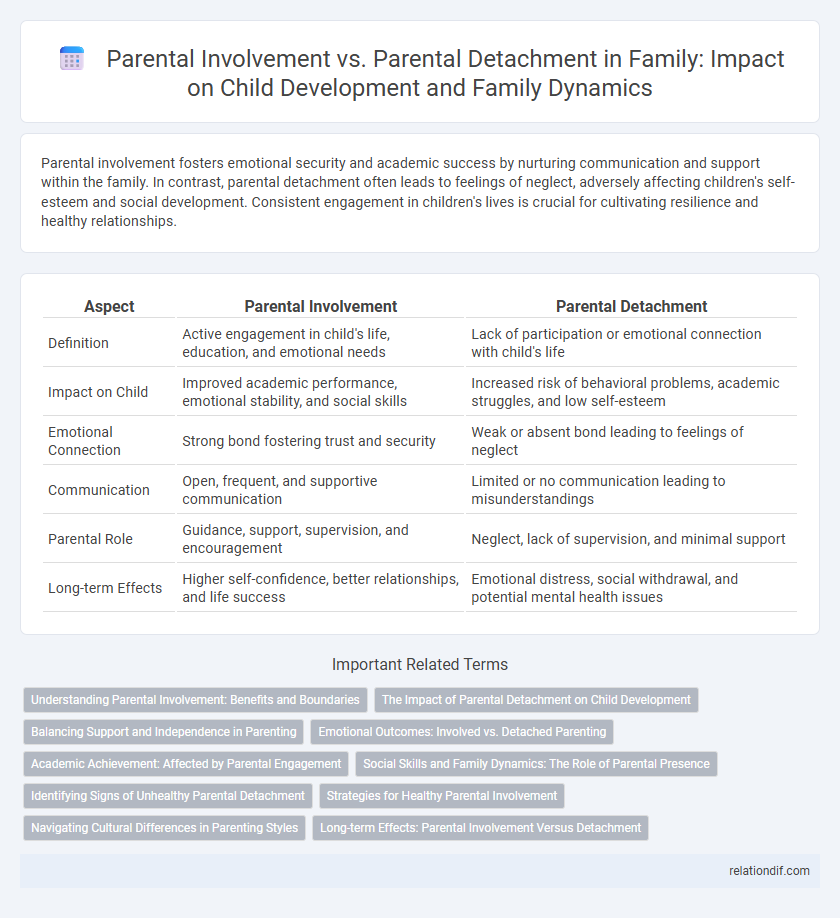Parental involvement fosters emotional security and academic success by nurturing communication and support within the family. In contrast, parental detachment often leads to feelings of neglect, adversely affecting children's self-esteem and social development. Consistent engagement in children's lives is crucial for cultivating resilience and healthy relationships.
Table of Comparison
| Aspect | Parental Involvement | Parental Detachment |
|---|---|---|
| Definition | Active engagement in child's life, education, and emotional needs | Lack of participation or emotional connection with child's life |
| Impact on Child | Improved academic performance, emotional stability, and social skills | Increased risk of behavioral problems, academic struggles, and low self-esteem |
| Emotional Connection | Strong bond fostering trust and security | Weak or absent bond leading to feelings of neglect |
| Communication | Open, frequent, and supportive communication | Limited or no communication leading to misunderstandings |
| Parental Role | Guidance, support, supervision, and encouragement | Neglect, lack of supervision, and minimal support |
| Long-term Effects | Higher self-confidence, better relationships, and life success | Emotional distress, social withdrawal, and potential mental health issues |
Understanding Parental Involvement: Benefits and Boundaries
Parental involvement significantly enhances children's emotional development, academic success, and social skills by providing consistent support and guidance within structured boundaries. Establishing clear limits prevents over-involvement, fostering independence while maintaining a secure family environment. Understanding the balance between active participation and respectful detachment is essential for nurturing confident, well-adjusted children.
The Impact of Parental Detachment on Child Development
Parental detachment significantly impairs emotional regulation and social skills in children, increasing risks of anxiety, depression, and behavioral problems. Studies link lack of parental engagement to lower academic performance and diminished self-esteem, affecting long-term cognitive and psychological development. Consistent parental involvement fosters secure attachment, critical for healthy identity formation and resilience during childhood.
Balancing Support and Independence in Parenting
Effective parenting involves balancing parental involvement and detachment to foster a child's growth and autonomy. Supportive engagement encourages emotional security and academic success, while allowing independence promotes critical thinking and resilience. Striking this balance helps children develop self-confidence and decision-making skills essential for adulthood.
Emotional Outcomes: Involved vs. Detached Parenting
Parental involvement significantly enhances children's emotional well-being by fostering secure attachments, higher self-esteem, and better stress regulation. Detached parenting, in contrast, often correlates with increased anxiety, depression, and emotional instability in children. Research from developmental psychology emphasizes that consistent emotional support from parents is crucial for optimal emotional development and resilience.
Academic Achievement: Affected by Parental Engagement
Parental involvement significantly enhances children's academic achievement by providing consistent support, motivation, and resource access, leading to higher grades and improved cognitive skills. Conversely, parental detachment often results in lower academic performance due to lack of guidance, decreased motivation, and limited educational support. Research consistently shows that engaged parents foster a positive learning environment, directly impacting student success and long-term educational outcomes.
Social Skills and Family Dynamics: The Role of Parental Presence
Parental involvement significantly enhances children's social skills by providing consistent guidance, emotional support, and opportunities for positive interactions within the family environment. In contrast, parental detachment often leads to underdeveloped social competencies and strained family dynamics due to a lack of engagement and emotional connection. Active parental presence fosters a nurturing atmosphere that promotes healthy communication and strengthens familial bonds, crucial for children's social and emotional growth.
Identifying Signs of Unhealthy Parental Detachment
Unhealthy parental detachment can be identified through signs such as emotional unavailability, lack of communication, and minimal involvement in a child's daily activities or milestones. Children may exhibit behavioral issues, withdrawal, or seek excessive attention elsewhere, indicating a gap in parental connection. Consistent absence during critical emotional or developmental moments often reflects underlying detachment problems requiring timely intervention.
Strategies for Healthy Parental Involvement
Effective strategies for healthy parental involvement include consistent communication, active listening, and setting clear boundaries to foster a supportive environment. Encouraging collaborative problem-solving and participating in children's educational activities enhance emotional connection and academic success. Balancing involvement without overstepping promotes autonomy while maintaining guidance, reducing risks of parental detachment.
Navigating Cultural Differences in Parenting Styles
Parental involvement significantly shapes child development and emotional well-being, with cultural norms influencing the degree and style of engagement. In many collectivist societies, parental involvement emphasizes community and interdependence, whereas individualistic cultures may prioritize fostering autonomy and independence. Understanding these cultural differences helps bridge gaps between parental expectations and child behavior, promoting effective communication and healthier family dynamics.
Long-term Effects: Parental Involvement Versus Detachment
Parental involvement is strongly linked to positive long-term outcomes, including higher academic achievement, improved social skills, and better emotional well-being in children. In contrast, parental detachment often correlates with increased risks of behavioral problems, lower self-esteem, and academic struggles. Research consistently shows that engaged parenting fosters resilience and lifelong success, while detachment can contribute to long-lasting negative effects on mental health and interpersonal relationships.
parental involvement vs parental detachment Infographic

 relationdif.com
relationdif.com